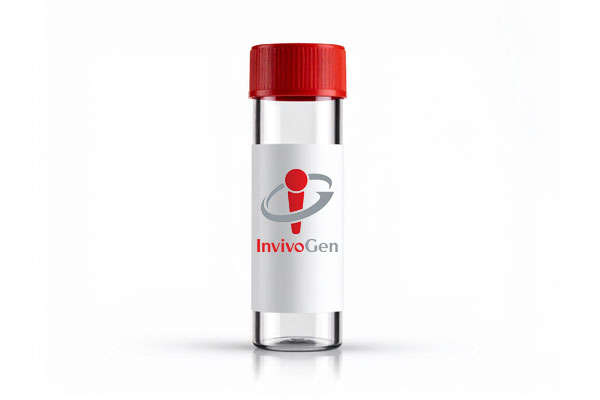Anti-hIL-29-mIgG1
-
Cat.code:
mab9-hil29NEW
- Documents
ABOUT
Recombinant anti-human IL-29 neutralizing monoclonal antibody
Anti-hIL-29-mIgG1 is a monoclonal antibody (mAb) targeting human interleukin 29 (hIL-29).
It was previously extracted from hybridoma cells (clone 6A11). It is now expressed and produced in Chinese hamster ovary (CHO) cells, ensuring reliability and lot-to-lot reproducibility. This antibody has been selected for its ability to efficiently neutralize the biological activity of hIL-29. Since mice lack an active IL-29 gene, there is no cross-reactivity.
IL-29 (also known as interferon lambda 1) is a member of the type III interferon (IFN lambda) cytokine family that exhibits several common features with type I IFNs: antiviral activity and antitumor activity [1, 2].
This antibody can be used together with HEK-Blue™ IFN-λ Cells treated with recombinant human IL-29 for screening and neutralization assays to block type III interferon signaling.
Key features
- Each lot is functionally tested and validated.
- The complete sequence of the antibody construct has been verified.
The absence of endotoxins is determined by the EndotoxDetect™ assay.
The hybridoma-derived Anti-hIL-29-IgG (mabg-hil29-3) antibody has been replaced by Anti-hIL-29-mIgG1 (mab9-hil29), which is produced by recombinant technology and purified from CHO cells.
1. Donnelly RP. & Kotenko SV., 2010. Interferon-lambda: a new addition to an old family. J Interferon Cytokine Res. 30(8):555-64.
2. Li M. et al., 2009. Interferon-ls: the modulators of antivirus, antitumor, and immune responses. J. Leukoc. Biol., 86:23-32.
All products are for research use only, and not for human or veterinary use.
SPECIFICATIONS
Specifications
IL-29, IFNλ1, IFNL1
Human
Neutralization (tested)
ELISA
Sodium phosphate buffer with glycine, saccharose, and stabilizing agents
Negative (tested using EndotoxDetect™ assay)
Each lot is functionally tested and validated.
CONTENTS
Contents
-
Product:Anti-hIL-29-mIgG1
-
Cat code:mab9-hil29
-
Quantity:100 µg
Shipping & Storage
- Shipping method: Room temperature
- -20°C
- Avoid repeated freeze-thaw cycles
Storage:
Caution:
Details
Interleukin-29 (IL-29) is a member of the type III interferon (IFN lambda) cytokine family, which comprises four distinct proteins called IFN-λ1 (interleukin-29, IL-29), IFN-λ2 (IL-28A), IFN-λ3 (IL-28B), and the poorly secreted IFN-λ4. It should be noted that in the mouse genome, IL-29 is a pseudogene. Type III IFNs exhibit several common features with type I IFNs: antiviral activity and antitumor activity [1, 2]. In fact, it has been demonstrated that IL-29 works together with type I IFN to promote an antiviral response to hepatitis [3]. IL-29 is produced by monocytes and dendritic cells in response to viral infection and stimulation with toll-like receptor (TLR) ligands [4]. IL-29 exerts its action following binding to a heterodimeric protein complex composed of two subunits, IFN lambda receptor 1 (IFNLR1) and IL-10 receptor beta (IL10Rβ). This leads to the recruitment of the Janus kinases, JAK1 and TyK2, and phosphorylation of STAT1 and STAT2, which then dimerize and interact with IFN regulatory factor 9 (IRF9), forming the ISGF3 complex. ISGF3 binds to IFN-stimulated response elements (ISRE) in the promoters of IFN-stimulated genes (ISG) to regulate their expression.
Besides its antiviral function, IFN-λ signaling also plays an important role in non-infectious diseases like autoimmune diseases and cancer [5-6]. Increased levels of IL‐29 were detected in the serum of patients with rheumatoid arthritis, psoriasis, as well as systemic sclerosis [6]. On the other hand, IFN-λ demonstrates broad-spectrum inhibitory activity across cancers, including bladder cancer, melanoma, colorectal carcinoma, and HPV-associated cervical malignancies [6]. Further research is required to elucidate the dual role of IFN-λ and to gain a deeper understanding of its complex role in immune regulation.
1. Donnelly RP. & Kotenko SV., 2010. Interferon-lambda: a new addition to an old family. J Interferon Cytokine Res. 30(8):555-64.
2. Li M. et al., 2009. Interferon-ls: the modulators of antivirus, antitumor, and immune responses. J. Leukoc. Biol., 86:23-32.
3. Pagliaccetti NE. et al., 2008. Interleukin-29 functions cooperatively with interferon to induce antiviral gene expression and inhibit hepatitis C virus replication. J Biol Chem. 283(44):30079-89.
4. Wolk K. et al., 2008. Maturing dendritic cells are an important source of IL-29 and IL-20 that may cooperatively increase the innate immunity of keratinocytes. J. Leukoc Biol. 83(5):1181-93.
5. Wang JM, et al., 2019. Insights into IL-29: Emerging role in inflammatory autoimmune diseases. J Cell Mol Med. 23(12):7926-7932
6. Tang B, et al., 2025. IFN-λ: Unleashing Its Potential in Disease Therapies From Acute Inflammation Regulation to Cancer Immunotherapy. Immunology. 176(2):197-214.
DOCUMENTS
Documents
Technical Data Sheet
Safety Data Sheet
Validation Data Sheet
Certificate of analysis
Need a CoA ?





